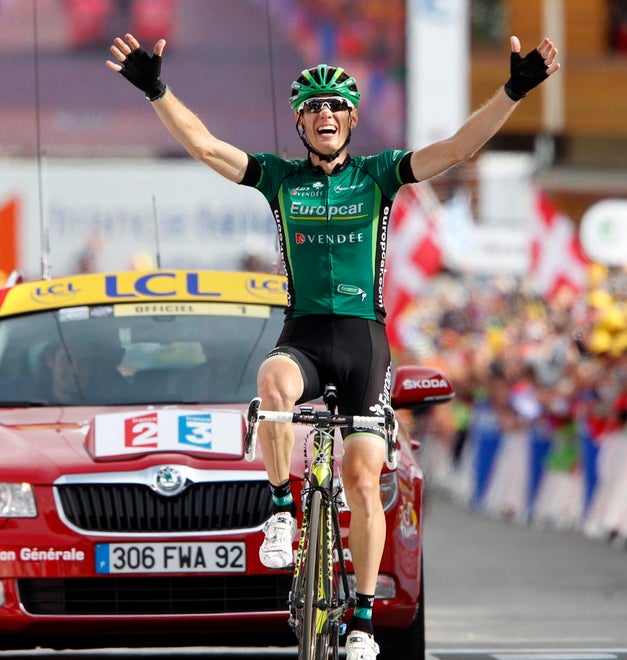
L’ALPE D’HUEZ, France (VN) – On a day when all French eyes were on L’Alpe d’Huez as the pride of the country Thomas Voeckler carried the maillot jaune toward the final weekend of the Tour de France, it was his teammate Pierre Rolland who stole the show. Rolland (Europcar), long pegged as the 25-years-later successor to Bernard Hinault, silenced his doubters when he won alone atop the biggest climb in the sport.
Rolland served Voeckler dutifully for 10 days as the race leader clung to his longshot yellow jersey. It was Rolland who paced Voeckler through improbable day after improbable day carrying the maillot jaune through the Pyrénées and then the Alps. When Voeckler could not match a Cadel Evans (BMC Racing) attack in pursuit of Alberto Contador (Saxo Bank-Sungard) and Andy Schleck (Leopard-Trek), he freed Rolland to fly a kilometer from the tunnel atop the day’s second climb.
“As long as Thomas wore the maillot jaune, I was working for him and absolutely not thinking of myself,” said Rolland. “On the Galibier he told me to go, that it was my day if I wanted the white jersey. It’s proof that Thomas is a very big champion because many other riders in his situation would have asked their teammate to stay with them, even if they were 10 minutes behind.”
Rolland said he knew on the Galibier that he would have a chance at the stage and the best young rider’s jersey.
“From the moment Thomas gave me the possibility to go and just do my stage today and go for white jersey, from that moment I was able to follow Evans and Schleck,” said Rolland.
As Voeckler slumped, waving his shoulders over his handlebars and bleeding time, Rolland jumped onto the Evans-led group. The Frenchman attacked with Garmin-Cervélo’s Ryder Hesjedal on a short pitch before Bourg d’Oisans and the base of the final climb of this year’s Tour, taking nearly a minute through the village and onto the first steep ramp. Rolland grinded along on the climb as Hesjedal and later Contador left him behind.
“[Thomas] told me that I had to go and so it was not possible for me to miss my goal,” said Rolland. “It gave me the extra force to stay 15 seconds behind Contador and come back.”
Samuel Sanchez (Euskaltel-Euskadi) rode toward the ski station with the polka dots of the KOM jersey in his mind and pulled Rolland back to Contador just before they reached the Alpine village. Rolland attacked, leaving the Spaniards on the final switchback, and rode solo to the first French win on L’Alpe since Hinault in 1986.
“I’m on a cloud. I don’t realize what I’ve achieved,” said Rolland. “It’s true that Hinault was the last French rider to win here, in 1986. That’s when I was born and so I didn’t see it. I’m just very, very proud.”
While he is only as old as Hinault’s 1986 win, Rolland knows the Badger’s palmarés well. The French press anointed him the next Hinault as a young professional, a weight that he shirked.
“I myself never pretended I was the next Bernard Hinault,” said Rolland. “You journalists said that, not me.”
In his second year as a professional Rolland scored a run of stage podiums at Paris-Nice and the Critérium du Dauphiné, where he also won the mountains classification. A year later, in 2009, he moved to Jean-René Bernaudeau’s Bbox Bouygues Telecom on a low-value contract and finished 21st overall in his first Tour (after the suspension of Mikel Astarloza). Rolland said he moved to Bernaudeau’s squad not for money, but to learn.
His fourth professional season was a school of hard knocks and Rolland struggled in his second Tour, in 2010.
“Sometimes you learn more when you’re suffering than when you’re winning,” he said. “Last year the Tour de France was not a good race for me and I learned from my mistakes.”
Questions surrounded Rolland’s potential. Some that were so quick to promote their next star began to doubt him. Hinault himself said earlier this year that this Tour was Rolland’s time to prove himself.
“He is under pressure now,” wrote Hinault before the Tour in a piece that ran in the VeloNews Tour de France preview issue. “By that I mean he has to make an impression now, this very year, and show whether he is a rider of the future. The only way to do that is to attack. He will never be criticized if he gets knocked back, but he will be criticized if he ends up being anonymous!”
After nearly two weeks in service of the maillot jaune Rolland did just that Friday and on the biggest stage in the sport. A Tour stage win makes a career. For a Frenchman, a win on L’Alpe d’Huez makes him a hero.
In his Friday L’Equipe column, three-time Tour stage winner Jean-François Bernard wrote, “(Rolland) has the whole future ahead of him and a good experience on the major tours. He is able to play an interesting role. But it is important not to give him the pressure after the victory atop L’Alpe d’Huez. He was pleased with a good leader that allowed him to have his card to play. The stage win and the jersey is flawless.”